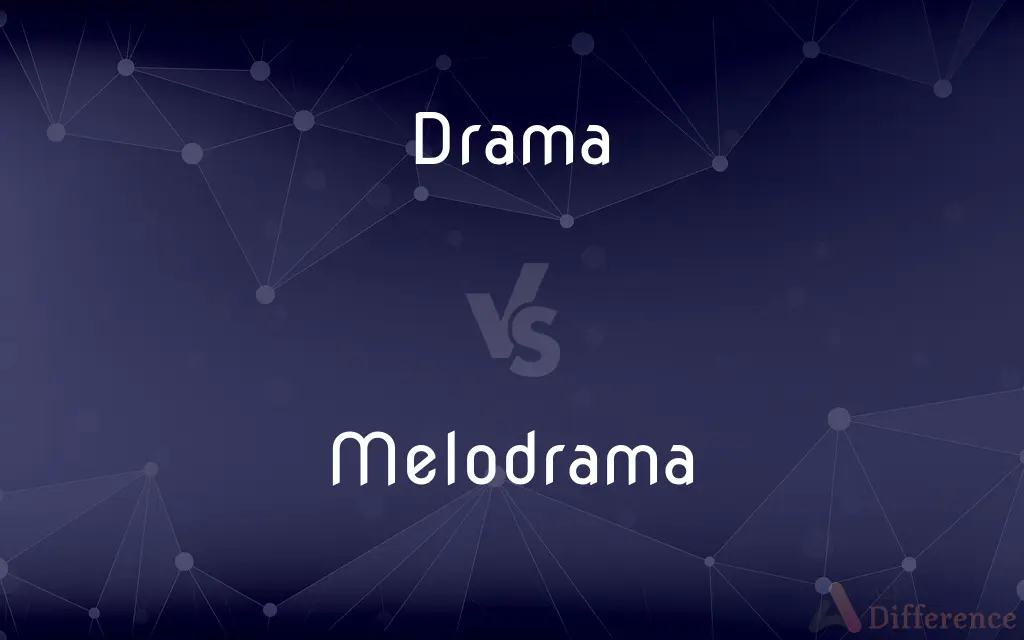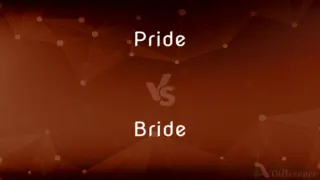Drama vs. Melodrama — What's the Difference?
By Tayyaba Rehman — Updated on September 17, 2023
Drama is a genre of narrative fiction or performance that depicts real-life situations and emotions, while melodrama exaggerates emotions and characters, often relying on stereotypes for heightened effect.

Difference Between Drama and Melodrama
Table of Contents
ADVERTISEMENT
Key Differences
Drama revolves around characters and their reactions to life's challenges, aiming for a realistic portrayal. Melodrama, in contrast, heightens these reactions, emphasizing sensationalism and exaggeration.
In drama, characters are multi-dimensional, often displaying a range of emotions and motivations. In melodrama, characters might be distinctly good or evil, with clear distinctions and predictable motivations.
While both drama and melodrama aim to evoke emotional responses, melodrama does so through extreme situations, exaggerated performances, and often uses music to amplify emotion, whereas drama seeks to mirror genuine human experiences.
Historically, drama has its roots in ancient Greece, embodying real-life situations in plays. Melodrama originated in the 18th century, stemming from musical theatre where the music intensified the emotional content.
Generally, drama is perceived as a more sophisticated and nuanced form of art. On the other hand, melodrama might be criticized for its overt sentimentality but is equally impactful in captivating and engaging audiences.
ADVERTISEMENT
Comparison Chart
Nature
Realistic portrayal of situations
Exaggerated and sensational portrayal
Character Depth
Multi-dimensional characters
Often stereotypical; clearly good or evil
Emotional Response
Derived from genuine human experiences
Achieved through heightened situations and emotions
Historical Origin
Ancient Greece
18th century musical theatre
Public Perception
Sophisticated and nuanced
Captivating but often overtly sentimental
Compare with Definitions
Drama
A composition in prose or verse presenting a story in dialogue or pantomime.
Shakespeare's Hamlet is a classic work of drama.
Melodrama
A work, like a film or play, that seeks to appeal to audiences' emotions.
The melodrama had the audience in tears by the end.
Drama
A genre portraying realistic characters and situations.
The movie was a drama about a soldier's return home.
Melodrama
Drama interspersed with songs or accompanied by music.
The old melodrama used music to heighten the emotional tension.
Drama
The art of composing or performing dramas.
She studied drama at the university.
Melodrama
A genre marked by its appeal to sentiment.
Many 19th-century novels were classic examples of melodrama.
Drama
A state or situation of conflict or emotional tension.
There's always some drama in high school friendships.
Melodrama
A situation or series of events characterized by exaggerated emotions.
The soap opera was full of typical melodrama twists.
Drama
Drama is the specific mode of fiction represented in performance: a play, opera, mime, ballet, etc., performed in a theatre, or on radio or television. Considered as a genre of poetry in general, the dramatic mode has been contrasted with the epic and the lyrical modes ever since Aristotle's Poetics (c.
Melodrama
A theatrical piece with exaggerated characters and events.
The play was a melodrama with a dastardly villain and a virtuous hero.
Drama
A play for theatre, radio, or television
A gritty urban drama about growing up in Harlem
Melodrama
In modern usage, a melodrama is a dramatic work wherein the plot, which is typically sensational and designed to appeal strongly to the emotions, takes precedence over detailed characterization. Melodramas typically concentrate on dialogue, which is often bombastic or excessively sentimental, rather than action.
Drama
An exciting, emotional, or unexpected event or circumstance
A hostage drama
An afternoon of high drama at Wembley
Melodrama
A drama, such as a play, film, or television program, characterized by exaggerated emotions, stereotypical characters, and interpersonal conflicts.
Drama
A prose or verse composition, especially one telling a serious story, that is intended for representation by actors impersonating the characters and performing the dialogue and action.
Melodrama
The dramatic genre characterized by this treatment.
Drama
A serious narrative work or program for television, radio, or the cinema.
Melodrama
Behavior or occurrences having melodramatic characteristics.
Drama
Theatrical plays of a particular kind or period
Elizabethan drama.
Melodrama
A kind of drama having a musical accompaniment to intensify the effect of certain scenes.
Drama
The art or practice of writing or producing dramatic works.
Melodrama
(countable) A drama abounding in romantic sentiment and agonizing situations, with a musical accompaniment only in parts which are especially thrilling or pathetic. In opera, a passage in which the orchestra plays a somewhat descriptive accompaniment, while the actor speaks
The melodrama in the grave digging scene of Beethoven's "Fidelio".
Drama
A situation or succession of events in real life having the dramatic progression or emotional effect characteristic of a play
The drama of the prisoner's escape and recapture.
Melodrama
Any situation or action which is blown out of proportion.
Drama
The quality or condition of being dramatic
A summit meeting full of drama.
Melodrama
Formerly, a kind of drama having a musical accompaniment to intensify the effect of certain scenes. Now, a drama abounding in romantic sentiment and agonizing situations, with a musical accompaniment only in parts which are especially thrilling or pathetic. In opera, a passage in which the orchestra plays a somewhat descriptive accompaniment, while the actor speaks; as, the melodrama in the gravedigging scene of Beethoven's "Fidelio".
Drama
A composition, normally in prose, telling a story and intended to be represented by actors impersonating the characters and speaking the dialogue
The author released her latest drama, which became a best-seller.
Melodrama
An extravagant comedy in which action is more salient than characterization
Drama
Such a work for television, radio or the cinema (usually one that is not a comedy)
Drama
Theatrical plays in general
Drama
A situation in real life that has the characteristics of such a theatrical play
After losing my job, having a car crash, and the big row with my neighbours, I don't need any more drama.
Drama
(slang) Rumor, lying or exaggerated reaction to life or online events; melodrama; an angry dispute or scene; a situation made more complicated or worse than it should be; intrigue or spiteful interpersonal maneuvering.
Drama
A composition, in prose or poetry, accommodated to action, and intended to exhibit a picture of human life, or to depict a series of grave or humorous actions of more than ordinary interest, tending toward some striking result. It is commonly designed to be spoken and represented by actors on the stage.
A divine pastoral drama in the Song of Solomon.
Drama
A series of real events invested with a dramatic unity and interest.
Westward the course of empire takes its way;The four first acts already past,A fifth shall close the drama with the day;Time's noblest offspring is the last.
The drama and contrivances of God's providence.
Drama
Dramatic composition and the literature pertaining to or illustrating it; dramatic literature.
Drama
A dramatic work intended for performance by actors on a stage;
He wrote several plays but only one was produced on Broadway
Drama
An episode that is turbulent or highly emotional
Drama
The literary genre of works intended for the theater
Drama
The quality of being arresting or highly emotional
Drama
Any situation or series of events having vivid, emotional, conflicting, or striking interest.
The courtroom was filled with drama as the verdict was read.
Common Curiosities
What is the primary purpose of Drama?
Drama seeks to represent real-life situations and genuine human emotions.
Which is older, Drama or Melodrama?
Drama is older, with roots in ancient Greece, while melodrama originated in the 18th century.
Can a Drama have elements of Melodrama?
Yes, a drama can incorporate melodramatic moments for heightened effect.
Why is music associated with Melodrama?
Historically, melodramas were plays with music; the music amplified the emotional content.
Can a film or book be both a drama and melodrama?
Yes, many works blend elements of both to create a rich narrative.
How does Melodrama differ in character portrayal?
Melodrama often uses exaggerated and stereotypical characters for heightened emotional effect.
Are all melodramas inherently negative or sad?
No, while melodramas are emotional, they can convey a range of feelings, including happiness and triumph.
How are characters typically portrayed in Drama?
In drama, characters are multi-dimensional, displaying a range of emotions and motivations.
Why might someone criticize Melodrama?
Due to its exaggerated nature, melodrama might be seen as less nuanced or too sentimental.
Can Drama be comedic?
Yes, while drama often delves into serious issues, it can also have comedic elements.
Which genre seeks to mirror genuine human experiences?
Drama aims to reflect real-life situations and genuine emotions.
Are melodramas less valuable than dramas?
No, both have their merits; while drama might be seen as more "realistic," melodrama captivates audiences with its heightened emotions.
Can melodrama be based on real events?
Yes, real events can be portrayed in a melodramatic manner by emphasizing or exaggerating certain aspects.
Which genre uses music to intensify emotion?
Melodrama historically used music to enhance the emotional experience.
What's a key difference in audience engagement between the two?
While both engage audiences, melodrama often does so through extreme situations and amplified emotions.
Share Your Discovery

Previous Comparison
Pride vs. Bride
Next Comparison
Suitcase vs. BagAuthor Spotlight
Written by
Tayyaba RehmanTayyaba Rehman is a distinguished writer, currently serving as a primary contributor to askdifference.com. As a researcher in semantics and etymology, Tayyaba's passion for the complexity of languages and their distinctions has found a perfect home on the platform. Tayyaba delves into the intricacies of language, distinguishing between commonly confused words and phrases, thereby providing clarity for readers worldwide.
















































